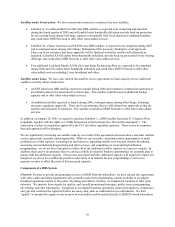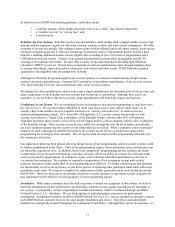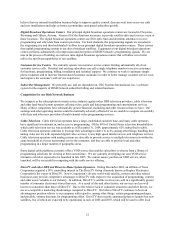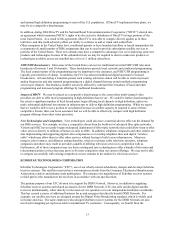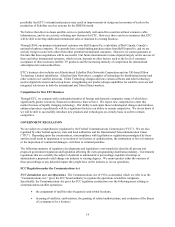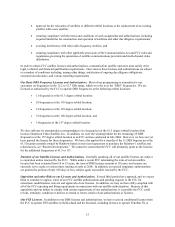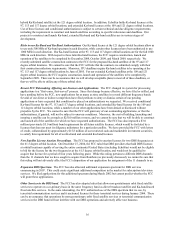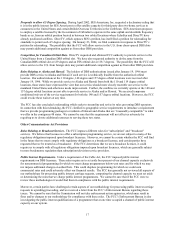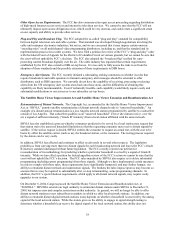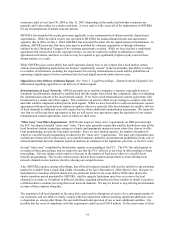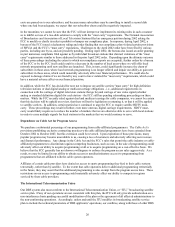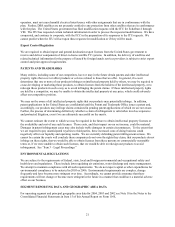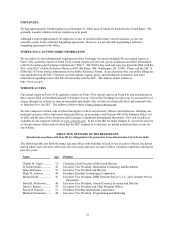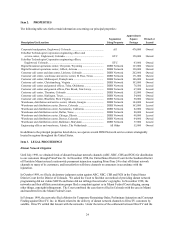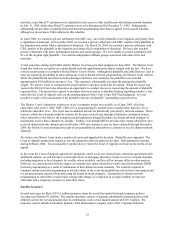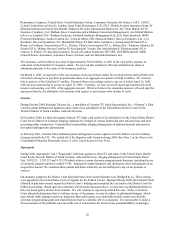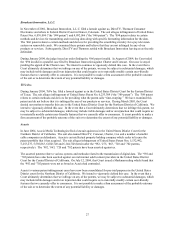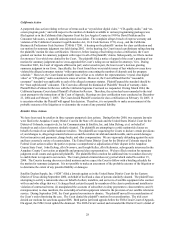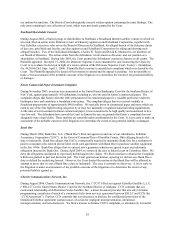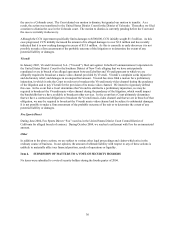Dish Network 2004 Annual Report Download - page 28
Download and view the complete annual report
Please find page 28 of the 2004 Dish Network annual report below. You can navigate through the pages in the report by either clicking on the pages listed below, or by using the keyword search tool below to find specific information within the annual report.20
costs are passed on to our subscribers, and because many subscribers may be unwilling to install a second dish
where one had been adequate, we expect that our subscriber churn could be negatively impacted.
In the meantime, we cannot be sure that the FCC will not interpret or implement its existing rules in such a manner
as to inhibit our use of a two-dish solution to comply with the “must carry” requirements. The National Association
of Broadcasters and Association of Local Television Stations filed an emergency petition during 2002 asking the
FCC to modify or clarify its rules to prohibit or hamper our compliance plan. In response, during April 2002, a
bureau of the FCC issued a declaratory ruling and order finding that our compliance plan violated certain provisions
of SHVIA and the FCC’s “must carry” regulations. Challenges to the April 2002 order have been filed by various
parties, including one by us, and are presently pending. During April 2002, the bureau also issued an order granting
in part numerous complaints filed against us by individual broadcast stations that claimed violations of the “must
carry” requirements similar to those addressed in the prior April 2002 order. Depending upon the ultimate outcome
of these proceedings (including the extent to which our compliance reports are accepted), further orders by a bureau
of the FCC or by the FCC itself could result in a decrease in the number of local areas where we will offer local
network programming until new satellites are launched. This, in turn, could significantly increase the churn of
subscribers in those areas where local network programming is no longer offered and impair our ability-to gain new
subscribers in those areas, which could materially adversely affect our financial performance. We could also be
exposed to damage claims if we are found by any court to have violated the “must carry” requirements, which could
have a material adverse affect on our financial position.
In addition, while the FCC has decided for now not to impose on satellite carriers "must carry" for high definition
television stations or dual digital/analog or multicast carriage obligations - i.e., additional requirements in
connection with the carriage of digital television stations that go beyond carriage of one video signal (whether
analog or standard definition digital) for each station - the FCC still has pending rulemaking proceedings on these
matters. While the FCC recently ruled against dual and multicast carriage for cable companies, we cannot be certain
that this decision will be upheld on review, that there will not be legislation overturning it, or that it will be applied
to satellite carriers. In addition, certain parties have continued to urge the FCC to require satellite HDTV must-
carry. These proceedings may result in further, even more onerous, digital carriage requirements. HDTV must-
carry would likely require us to reduce the number of markets that we are otherwise able to serve with local stations
in order to carry multiple signals for local stations in the markets that we would continue to serve.
Dependence on Cable Act for Program Access
We purchase a substantial percentage of our programming from cable-affiliated programmers. The Cable Act’s
provisions prohibiting exclusive contracting practices with cable affiliated programmers have been extended from
October 2002 to October 2007, but this extension could be reversed. Upon expiration of those provisions, many
popular programs may become unavailable to us, causing a loss of customers and adversely affecting our revenues
and financial performance. Any change in the Cable Act and the FCC’s rules that permit the cable industry or cable-
affiliated programmers to discriminate against competing businesses, such as ours, in the sale of programming could
adversely affect our ability to acquire programming at all or to acquire programming on a cost-effective basis. We
believe that the FCC generally has not shown a willingness to enforce the program access rules aggressively. As a
result, we may be limited in our ability to obtain access (or nondiscriminatory access) to programming from
programmers that are affiliated with the cable system operators.
Affiliates of certain cable providers have denied us access to sports programming they feed to their cable systems
terrestrially, rather than by satellite. To the extent that cable operators deliver additional programming terrestrially
in the future, they may assert that this additional programming is also exempt from the program access laws. These
restrictions on our access to programming could materially adversely affect our ability to compete in regions
serviced by these cable providers.
The International Telecommunication Union
Our DBS system also must conform to the International Telecommunication Union, or “ITU,” broadcasting satellite
service plan. If any of our operations are not consistent with this plan, the ITU will only provide authorization on a
non-interference basis pending successful modification of the plan or the agreement of all affected administrations to
the non-conforming operations. Accordingly, unless and until the ITU modifies its broadcasting satellite service
plan to include the technical parameters of DBS applicants’ operations, our satellites, along with those of other DBS


